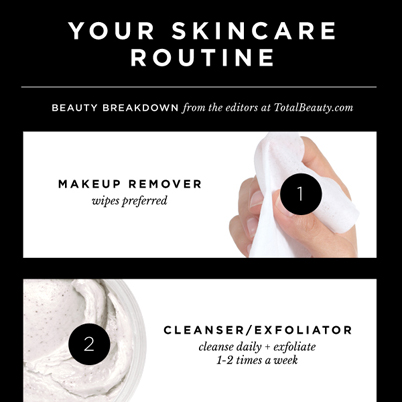Vitamin A
Vitamin A is the source of the anti-aging powerhouse retinol. It's what builds and repairs collagen and elastin, says Dr. Harold Lancer, author of "Younger: The Breakthrough Anti-Aging Method for Radiant Skin." "It's also what keeps the color in your skin uniform and protected." Just as important as using a retinol product on your skin at night: boosting the amount of vitamin A in your body by eating a balanced diet rich in leafy greens and other veggies, fruits and lean proteins. And if all else fails, take a multivitamin or supplement.
AHAs
Alpha hydroxy acids (AHAs) such as glycolic acid and lactic acid are often found in cleansers, exfoliating agents and moisturizers. "As you age, cell turnover slows down and you accumulate more dull, dead skin," says Dr. Lancer. When applied directly to your skin, AHAs speed cell turnover, shedding dead cells and revealing new ones.
Vitamin A is the source of the anti-aging powerhouse retinol. It's what builds and repairs collagen and elastin, says Dr. Harold Lancer, author of "Younger: The Breakthrough Anti-Aging Method for Radiant Skin." "It's also what keeps the color in your skin uniform and protected." Just as important as using a retinol product on your skin at night: boosting the amount of vitamin A in your body by eating a balanced diet rich in leafy greens and other veggies, fruits and lean proteins. And if all else fails, take a multivitamin or supplement.
AHAs
Alpha hydroxy acids (AHAs) such as glycolic acid and lactic acid are often found in cleansers, exfoliating agents and moisturizers. "As you age, cell turnover slows down and you accumulate more dull, dead skin," says Dr. Lancer. When applied directly to your skin, AHAs speed cell turnover, shedding dead cells and revealing new ones.
Beauty sleep
One of the best age fighters happens to be totally free: sleep. When you don't get enough sleep, your body releases more cortisol (the stress hormone that breaks down collagen) and curbs the amount of human growth hormone you produce. "HGH works during the night to repair tissue, restoring skin cells after the wear and tear of the day," says Dr. Lancer. The way you sleep also factors into the aging process. Sleeping face-down puts pressure on your face and increases fine lines.
One of the best age fighters happens to be totally free: sleep. When you don't get enough sleep, your body releases more cortisol (the stress hormone that breaks down collagen) and curbs the amount of human growth hormone you produce. "HGH works during the night to repair tissue, restoring skin cells after the wear and tear of the day," says Dr. Lancer. The way you sleep also factors into the aging process. Sleeping face-down puts pressure on your face and increases fine lines.
Chemical peels
Chemical peels utilize concentrated forms of AHAs, which shed and regenerate skin cells quickly. Most peels are derived from fruit acids, and you can find weaker at-home treatments that have a low percentage of acid or stronger treatments at your derm's office. Chemical peels can address problems like sun damage and those subtle, crepe-y lines around the eyes and mouth, says Dr. Lancer.
Ceramides
"Ceramides form a plate-like barrier between our skin cells and help restore the skin's natural barrier," says Dr. Heather Woolery-Lloyd, co-founder of Specific Beauty Skincare. Think of ceramides as the giant padlock that holds in your skin's moisture. As you age and your skin gets drier, topicals containing ceramides can help you achieve dewier, more radiant skin.
Vitamin C
Every day, your skin gets exposed to sun, environmental pollutants and a whole lot of other damaging gunk that causes uneven skin texture, sagging, dryness and fine lines. Vitamin C not only helps reverse free-radical damage, it also boosts collagen production. Look for daytime serums that contain vitamin C and be sure you're getting the maximum recommended daily allowance (90 milligrams) in your diet. (One navel orange contains a whopping 82.7 milligrams of vitamin C.)
Chemical peels utilize concentrated forms of AHAs, which shed and regenerate skin cells quickly. Most peels are derived from fruit acids, and you can find weaker at-home treatments that have a low percentage of acid or stronger treatments at your derm's office. Chemical peels can address problems like sun damage and those subtle, crepe-y lines around the eyes and mouth, says Dr. Lancer.
Ceramides
"Ceramides form a plate-like barrier between our skin cells and help restore the skin's natural barrier," says Dr. Heather Woolery-Lloyd, co-founder of Specific Beauty Skincare. Think of ceramides as the giant padlock that holds in your skin's moisture. As you age and your skin gets drier, topicals containing ceramides can help you achieve dewier, more radiant skin.
Vitamin C
Every day, your skin gets exposed to sun, environmental pollutants and a whole lot of other damaging gunk that causes uneven skin texture, sagging, dryness and fine lines. Vitamin C not only helps reverse free-radical damage, it also boosts collagen production. Look for daytime serums that contain vitamin C and be sure you're getting the maximum recommended daily allowance (90 milligrams) in your diet. (One navel orange contains a whopping 82.7 milligrams of vitamin C.)
Vitamin D
News flash: Laying in the sun or tanning in a salon are not excusable ways to get your vitamin D intake. This will only age you faster. But vitamin D is important in helping with calcium absorption, which in turn supports healthy cell turnover according to Dr. Lancer. Fish, dairy, fortified cereals and mushrooms are all rich in vitamin D.
News flash: Laying in the sun or tanning in a salon are not excusable ways to get your vitamin D intake. This will only age you faster. But vitamin D is important in helping with calcium absorption, which in turn supports healthy cell turnover according to Dr. Lancer. Fish, dairy, fortified cereals and mushrooms are all rich in vitamin D.
Exfoliate
Exfoliating is a crucial step in your anti-aging skin care routine. Dr. Lancer recommends exfoliating with a mechanical or chemical exfoliant once per week at night, then exfoliating more frequently as you learn what your skin can tolerate. (Exfoliate less often if you have sensitive skin or rosacea.) "Chemical exfoliants are topical agents that can contain citric, glycolic or lactic acids," he explains. "Mechanical agents use some sort of grain or bead." But be cautious when using those scrubby exfoliants. Irregular or jagged particles, such as walnuts or apricot pits, can tear the skin.
Exercise
"Moderate exercise, such as Pilates, yoga and stretching, is crucial to skin health," says Dr. Lancer. "It increases circulation, oxygenating the skin and organs and helps to flush toxins out of the skin through our sweat." You can even do facial yoga! See six face yoga poses.
Exfoliating is a crucial step in your anti-aging skin care routine. Dr. Lancer recommends exfoliating with a mechanical or chemical exfoliant once per week at night, then exfoliating more frequently as you learn what your skin can tolerate. (Exfoliate less often if you have sensitive skin or rosacea.) "Chemical exfoliants are topical agents that can contain citric, glycolic or lactic acids," he explains. "Mechanical agents use some sort of grain or bead." But be cautious when using those scrubby exfoliants. Irregular or jagged particles, such as walnuts or apricot pits, can tear the skin.
Exercise
"Moderate exercise, such as Pilates, yoga and stretching, is crucial to skin health," says Dr. Lancer. "It increases circulation, oxygenating the skin and organs and helps to flush toxins out of the skin through our sweat." You can even do facial yoga! See six face yoga poses.
You know those stories about the latest, greatest breakthroughs and research into anti-aging -- the ones that make you feel like you need a masters degree in chemistry, biology and dermatology to understand? This isn't one of them. Because creating an amazing anti-aging skin care regimen isn't about knowing every nuance behind the science of anti-aging. It's about distilling all of the research and how-to tips out there into a plan that suits you -- a plan that fits your life and your unique skin care needs.
Consider this your elementary guide to youthful, wrinkle-free and radiant skin. It's as easy as A-B-C.
Consider this your elementary guide to youthful, wrinkle-free and radiant skin. It's as easy as A-B-C.






